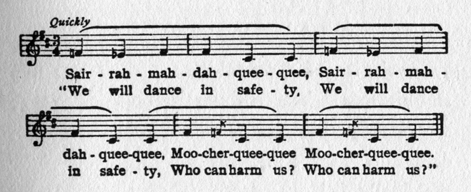Ten little prairie dogs, one day, long time ago, started up out of their hole with their drum. Their mother said: "Do not dance outside, my children, for if you do an eagle will swoop down upon you and eat you all up."
But the ten little prairie dogs only laughed and went on outside to dance. They sang as they danced:

Sure enough while they were dancing around the hole, an eagle came down and swallowed them all. The last one she ate was the prairie dog with the drum and she swallowed him drum and all.
Then the eagle went to get a drink of water. When she leaned down to drink, she felt very queer and she could hear a drum beating. It was the ten little prairie dogs dancing inside her. They danced so hard and made the eagle so sick that she finally fell over dead. Then all of the little prairie dogs came out again and ran home to tell their mother all about it.

An eagle came down and swallowed them all
The next day the ten little prairie dogs started outside again to dance. "Do not go out, my children," said their mother, "the Indians have set a trap for you. They will catch you and eat you if you go outside."
But the little prairie dogs only laughed and went outside again.

"Let us see what a trap is like"
"Let us go and see what a trap is like," suggested one little prairie dog, so they all started over the prairie in search of a trap. They found one and all got caught in it. This time they never got back home to tell their mother all about it; for the Indians roasted and ate them.
This chapter has been put on-line as part of the
BUILD-A-BOOK Initiative at the
Celebration of Women Writers.
Initial text entry and proof-reading of this chapter were the work of volunteer
Judith Fetterolf.